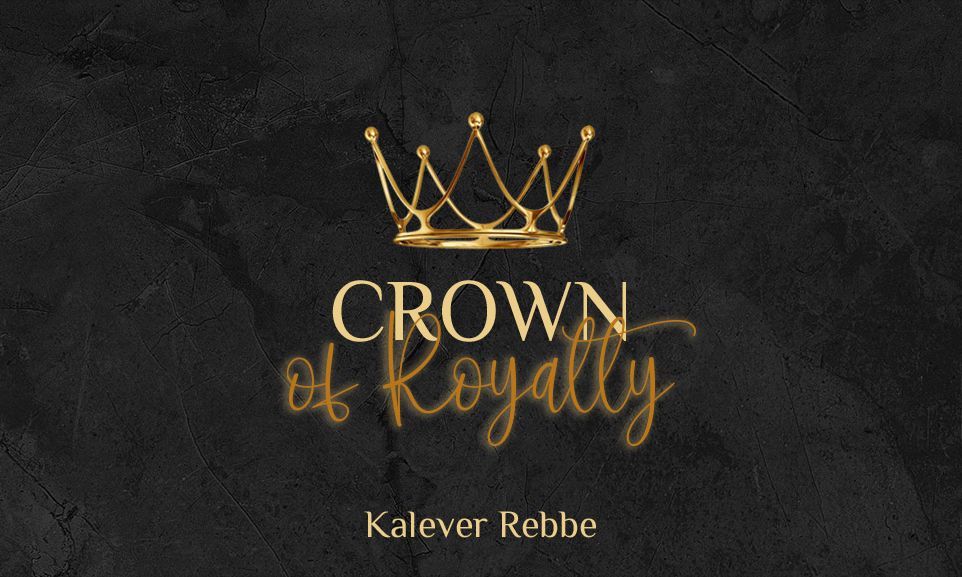
Crown of Royalty
In the past, nations - especially the daughters of royalty - cherished the trait of modesty. They honored modesty and realized that it represented self-respect. Similarly, Jewish women wear the crown of royalty (modesty).

“You shall bring a new meal offering to the Lord”. (Vayikra 23:16)
The Definition of Paris
The Shem M’Shmuel (Devarim, 5676) wrote that each nation serves as a conduit for spreading a specific spiritual impurity. The French nation was the most promiscuous of the nations, because they were the source of that devastating spiritual contaminant in the world.
In Yisroel Kedoshim (Section 9), R’ Tzadok HaKohein from Lublin explained, that the name of the French capital was fitting. When spelled in Hebrew, Paris (פריז) shares the same root as the word פרוץ-broken. Therefore, the Torah calls a city that is without walls, a “Prazi” (Devarim 3:5). In the city of Paris, the walls that safeguarded tzniut, modesty, were broken and destroyed.
The Torah teaches (Devarim 23:15), “He should not see anything unseemly among you and would turn away from you”. Chazal taught (Gitin 90b) that “anything unseemly” refers to a woman who dresses immodestly and conducts herself promiscuously in public. Rashi gives there an example: “like the French”.
This Rashi is the basis for the law (Turei Zahav on Even HaEzra, 119:7) that a woman who dresses promiscuously – like the French – is “unseemly”.
Illogical Trends
The concept of tzniut – dressing and behaving modestly – is a tremendous challenge nowadays. The impurity of France has infected every culture. Woman of all ages are influenced by the fashion and styles defined by a culture void of modesty. In addition, they dress in clothing that the rabbis have ruled should be forbidden according to Torah law.
This is illogical. People around the world rush to buy the clothing that a few people in Paris – or elsewhere – have decided is fashionable and appropriate. They discard last year’s clothes and purchase an entire new wardrobe. They wear it even when they feel uncomfortable wearing these styles because they are short or revealing. Yet, they blindly follow the trends set by a select few.
This has destroyed good families. Inappropriate clothing creates a challenging dynamic that can have devastating outcomes. When a woman dresses promiscuously, she attracts the attention of others. Chazal taught that this breach of modesty creates a divide between a husband and his wife. They eventually begin to distrust each other. This is one of the main contributors to divorces. It can even lead to crimes of passion like revenge, violence, jealousy, and murder.
The Symbol of Royalty
In the past, other cultures and nations cherished the trait of modesty, especially the daughters of royalty and the aristocracy. They realized the harm that could be done if someone pursues their lustful desires. They honored modesty and realized the self-respect that it represented.
The Maharal from Prague explained that this is why the crown is the symbol of royalty. It sits on the head of the king, above all else, to demonstrate that a true king is not subjugated to or influenced by anything else but his royalty.
I can remember living in London about 50 years ago when I heard about a scandal involving the royal family. One of the daughters had broken with the traditions and wore inappropriate clothing in public. That was a scandal in those days.
Behaving like Animals
Nowadays, with the proliferation of technology, people have lost the ability to focus and concentrate. They have become numb, and blindly follow trends and fashions, even when they are completely illogical.
Animals behave this way. They follow where they are led without thinking about it. They easily walk into the slaughterhouse!
Chazal taught (Soteh 15b) that a deviant woman, a Sotah, must bring a sacrifice that, unlike other sacrifices that use wheat, must consist of an animal’s food, because her behavior was like an animal. Meaning, she behaved like an animal that lacks the intellectual capability to understand the ramifications of her actions. She dressed and behaved promiscuously without contemplating the potential outcome; without thinking what that behavior might lead to, without worrying about the kind of attention this might attract and the damage it would do to the peace and serenity of her household or marriage. Therefore, she must bring a sacrifice of barley, the food animals eat, symbolizing that she behaved without reason or logic like an animal.
The Strength of Jewish Women
We can apply this concept to Sefirat HaOmer. In Egypt, the Jews were surrounded by a culture that was promiscuous, and consequently, their intellectual abilities were compromised. Upon leaving Egypt, they began strengthening their spirituality, day by day, level after level, until they were prepared to receive the Torah, with all their intellectual capacity and strength. They evolved and became able to conduct themselves in a holy manner.
Therefore, after leaving Egypt, Hashem commanded that we bring the Omer sacrifice of barley, and on Shavuot, we offer sacrifices of bread and wheat. This serves as a reminder that without our intellect, we are like animals, and we can blindly follow the promiscuous behaviors of the culture that surrounds us. However, through our efforts and with Hashem’s help we can become self-aware and holy.
Therefore, our pasuk teaches: “You shall bring a new meal offering to the Lord… Holiness will be to you”.
Hashem provides the strength to overcome these challenges in every generation. We see today, Jewish women around the globe breaking these trends and dressing modestly despite what the current style might be.
Hashem should continue to give the Jewish people the strength to realize, understand and know the ramifications of this impure behavior. They should be able to build safeguards and in doing so protect the sanctity, peace and harmony of their Jewish homes.
***
The Kalever Rebbe is the seventh Rebbe of the Kaalov Chasidic dynasty, begun by his ancestor who was born to his previously childless parents after receiving a blessing from the Baal Shem Tov zy”a, and later learned under the Maggid of Mezeritch zt”l. The Rebbe has been involved in outreach for more than 30 years, and writes weekly emails on understanding current issues through the Torah. You can sign up at www.kaalov.org.








Tell us what you think!
Thank you for your comment!
It will be published after approval by the Editor.